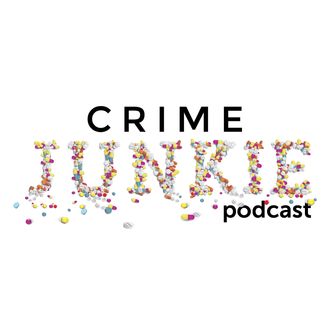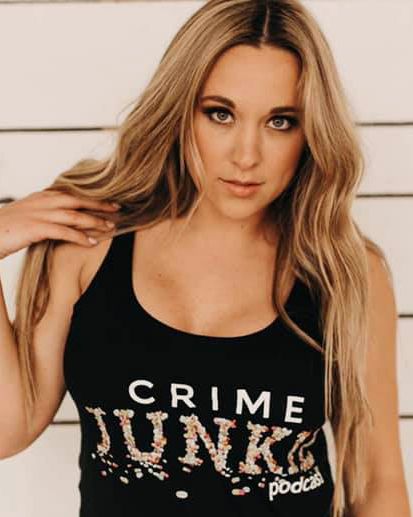
There’s trouble in the true-crime podcast world.
Over the past two weeks, the popular series Crime Junkie has found itself caught up in plagiarism scandal after a former Arkansas Democrat-Gazette reporter, Cathy Frye, accused the podcast of using her work on a 2002 murder without proper attribution.
“You relied on my series about Kacie Woody to air your podcast, which, I would assume, profits by the sharing of crime stories. At one point, you quoted a portion of MY copyrighted story almost verbatim,” she wrote in a post on the podcast’s Facebook group. “I then started listening to your other podcasts and — SURPRISE! — discovered that you don’t cite sources or credit news organizations.” Frye went on to threaten legal action unless the podcast removed the relevant episode from their distribution channels.
Frye’s accusation kicked up a fair bit of attention, drawing coverage from the likes of Variety, BuzzFeed News, and even the New York Times. The Variety piece, in particular, identified a few other accusations of plagiarism leveled against the Crime Junkie team, and the podcast has since issued a statement, sent to Variety and posted on its Facebook group, that it has decided to take down episodes where “their source material could no longer be found or properly cited.” The show did not specify just how many errant episodes would be pulled off its podcast feed, but at least five have been removed so far.
There’s a lot going on in this story. The most prominent thread so far appears to be the way this brouhaha links the still-emerging nature of the podcast ecosystem to the broader (and long ongoing) discussions about the formulation and governance of ethical conduct in the digital world, which remains quite lawless in many corners. Podcasters and media executives alike continue to throw around the cliché that “podcasting is still the Wild West” as a positive — as in, “There are no rules! There are no gatekeepers! You can do whatever you want and figure it all out on your own!” — which is probably precisely the mentality that engendered this fracas, but it’s worth remembering that this conceptualization isn’t exactly sui generis: It’s a direct extension of the way people once thought about the internet more broadly.
As such, it doesn’t really come as a surprise, exactly, that Crime Junkie, a production by two decidedly nonexperts (neither Ashley Flowers nor Brit Prawat, the two hosts on the show, explicitly identify as a journalist or investigator, though Prawat claims to have worked for a private investigator in the past), would find itself embroiled in such a scandal.
Why the mainstream attention on Crime Junkie, though? Part of this probably has to do with how the scandal interrupts what appears to be the podcast’s fairy-tale narrative. Since launching two years ago, the show appears to have successfully rode the wave of both the true-crime podcast boom and the podcast boom more generally to accrue a considerable following. Before the accusations popped up, the podcast says that it averaged over 1.6 million unique listens per episode. The show seems to perform well on the Apple Podcast charts, and the team claims to be on track for seven figures in revenue between its Patreon and advertising businesses, per Variety. All that contributed to a narrative of momentum, and a major payoff appeared to be looming just around the corner. In May, Deadline reported that the team appears to be generating interest from entertainment companies for new projects, including a possible television deal and a new podcast project that would see host Ashley Flowers collaborating with local police authorities (which itself sounds ethically sticky, but we’ll leave that aside for now).
The thing about the still-emerging podcast industry, though, is that aside from the new project interest, it’s pretty hard to verify any of these performance metrics. There are no reliable third-party sources to verify the listener numbers, the Apple Podcast Charts can be gamed, and there has been evidence that Apple Podcast reviews can be bought. On top of that, the show doesn’t publicly display its Patreon numbers, which is something that other popular Patreon-driven podcasts, like Chapo Trap House, feel bold enough to do. And so, in the wake of Crime Junkies’ credibility hit by these plagiarism accusations, it may well be reasonable to ask a few follow-up questions about the podcast’s various claims to success more broadly.
What will this scandal yield? One possible outcome could be a bump in scrutiny of the true-crime podcast community, which has largely thrived off to the side as an internet subculture. This subculture, whose largely DIY ethos tends to be somewhat fluid when it comes to ethical considerations, has long seen accusations of plagiarism pop up from time to time throughout its ranks. It has also seen worse scandals, most notably with the endless string of controversy surrounding Sword & Scale, a very popular true-crime podcast that was banned from Patreon and dropped by its distributor, Wondery, earlier this year when its host, Mike Boudet, published misogynistic comments on the show’s official Instagram account. (According to the Wrap, Boudet had a history of receiving backlash for abusive speech against the LGBTQ community, the elderly, and those suffering from mental illness.)
Due to the seeming popularity of Crime Junkie, though, this brouhaha appears to be the community’s highest-profile scandal yet, and it’s one that may have material effects on the subculture as a whole. Specifically, it might lead to some increased recognition by Hollywood studios that true-crime podcasts like Crime Junkie — namely, the ones that primarily repackage others’ research and reporting on grisly murders for the purposes of entertainment at volume, as opposed to more journalistic fare like In the Dark and Criminal — might be riskier assets to bring into a development pipeline. We’re currently in a moment where podcasts are the intellectual-property source du jour, so much so that it doesn’t take as much as you would think to foster adaptation interest. But with all the attention this incident has received, it may bring to light the (obvious) realization that not all podcasts are as equally valuable as intellectual property, and that some podcasts might carry more possible downsides than upsides.
Indeed, podcasting is still the Digital Wild West in many respects (sure, I’ll recycle the cliché), and the true-crime-podcast world is perhaps purest embodiment of this, in ways both good and bad. It’s unclear what, exactly, the Crime Junkie scandal will mean for its conduct and vitality over the long run, but it will be fascinating to see how the community, as a whole, will react to the moment.



